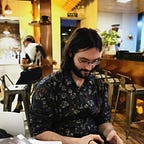Wearing Glasses and Reading Horror
I can’t remember a time I didn’t require glasses. For what seems like forever I have had this special ability to perceive the world in two different ways: the normal way which (I assume) roughly corresponds to what is right and proper, and the blurry, warped version, like looking through a rain-drenched pane of glass, where things fade quickly to the point of illegibility.
Of course I don’t imagine I am the only one capable of this fear. And surely, taking acid or shrooms or a sharp knock on the head might well produce a similar or more exaggerated effect. None of those methods, however, achieve the persistence and immediacy which removing my glasses does. What’s more, this other world lurks continually on the outskirts of my perception, in my peripheral vision, or if I angle my eyes upwards or downwards far enough.
This world can be scary, too. Familiar objects lose their familiarity, and identifications previously made with confidence become tentative guesses. I remember vividly, when I was a child, a time where I’d fallen asleep on the couch playing Prince of Persia. In this particular game, the titular prince is tasked with rewinding time using a magical dagger, which in practice involves lots of running on walls and stabbing zombies. At the point I’d fallen asleep, my character was out in what had been the Sultan’s menagerie, with all the sounds of rustling leaves, bird calls and bestial noises of unknown origin. In the world where I had my glasses on, these details were disquieting, but when I woke up and found my glasses missing they were horrifying. It seemed obvious that these sounds were coming from the game, but in the world where I couldn’t see three feet in front of my face, who could be sure? To that backdrop of hooting, screeching and rustling I searched the entire house for my glasses and then, with increasing alarm, for my family, but could find neither. They had vanished, and my sight with them.
All this to say I’ve been reading a fair amount of horror. In Italy last year I breezed through A.C. Wise’s The Ghost Sequences, and I’ve almost finished John Langan’s Corpsemoutu and Other Biographies, both of which I recommend. I’ll snatch up any short horror stories I can find on tor.com, and though I wouldn’t mention it in polite company I’ve spent a lot of time in the archives of creepypasta.com.
My intuition is that, if you happened to ask my friends, most of them would agree that I really like horror. Personally, though, I’m not sure how much I agree with that statement — probably the answer is somewhere between 50 and 80 percent. I’ve alwaI know for a fact I hate being scared. I quite enjoy the ambiance, the atmosphere that horror generates, but the being scared is always the worst part; I’ve long said the best horror game is one where the monster always /almost/ catches you.
What I enjoy about horror, rather, is what I enjoy about surrealist art, which is the feeling when you take off the glasses: that it’s the same world you’ve always known, that you should be able to recognize its landmarks and place the things you’re seeing and the experiences you’re having, but you can’t. For some reason, you can’t see three feet in front of you, and everything that was familiar before is inverted, as if in a funhouse mirror. This feeling comes in greater or less degrees of terrifying. For example, I’ve always found Magritte’s Empire of Light paintings unnerving and disquieting, nor do I imagine that I am the only one who has such a reaction. Quotes from Magritte himself do nothing to suggest that this was his intent, and in fact he describes the painting of coming from a place of “admiration” for both night and day, without his being able to choose one as his preference. Viewing these paintings, though, I can’t help extrapolating. The idea of a world where a landscape can be in night while the sky shows day calls into question a fundamental assumption I hold about the universe.
Without that mooring, who knows what else is possible in the place Magritte has created, and what the implications are that follow? The way that this reality seems to otherwise mirror ours save for this single divergence serves only to make it worse; I’ve always found that the closer the horror hews to the world as we know it the scarier it is, because it proves how little would need to change for us to find ourselves completely lost and out of our depth.
In John Langan’s Corpsemouth, one story concerns a young man who, by listening to the cassette tape of a certain underground band, becomes able to view an alternate dimension overlaid atop the real one. His friend is enthralled by this find, and insists that anything that belies the mundanity of our day to day existence is worth investigating further, no matter the cost — in classic horror fashion, his curiosity is punished rather than rewarded, but I suspect most of us would be lying if we said we didn’t understand his need to push further. As much as these sorts of scenes unnerve us, they also demand investigation, they challenge us to bring these experiences into alignment with the rest of our lives, even if that should prove impossible, and to this urge I also am not immune. I still take off my glasses sometimes, randomly, even if it renders me helpless, just to see what things look like from the other side.
